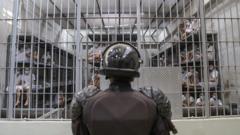The Supreme Court issued a stay on a lower court's order demanding the return of Kilmar Abrego Garcia from El Salvador, amid claims of an administrative error in his deportation.
Supreme Court Halts Order to Repatriate Deported Salvadoran Man

Supreme Court Halts Order to Repatriate Deported Salvadoran Man
Background on the Supreme Court's temporary pause regarding the deportation of Kilmar Abrego Garcia.
In a swift decision, Chief Justice John Roberts intervened to pause a Maryland district court’s ruling that mandated the return of Kilmar Abrego Garcia, a Salvadoran man deported due to what the Trump administration describes as an "administrative error." The administration's move came after a judge ruled earlier that Garcia should be brought back from a high-security prison in El Salvador, where he is currently held.
On March 15, Garcia was deported amidst accusations from the government that he is associated with the notorious MS-13 gang, a claim his attorney has firmly denied. The U.S. government's emergency appeal argued that the Maryland judge exceeded her authority and that the U.S. lacks the power to compel El Salvador to act on the ruling, citing that it is a sovereign nation.
US Solicitor General D. John Sauer emphasized that the authority over foreign relations lies with the president, not the courts. An administrative stay allows the Supreme Court to review the case thoroughly without the immediate pressure of the deadline set by the Maryland judge, which mandated Garcia's return by midnight on Monday.
Garcia was initially detained when he was apprehended for his undocumented status after arriving in the U.S. as a teenager, and his legal battles have seen significant back and forth over claims of his alleged gang affiliations. In prior hearings, judges had granted him protection against deportation due to fears of gang persecution in El Salvador. His attorney, Simon Sandoval-Moshenberg, described the deportation as tantamount to a "forcible expulsion."
Last week, during a federal court hearing, Judge Paula Xinis expressed skepticism toward the Trump administration's legal arguments, indicating that the handling of Garcia's case was suspect. Following her ruling, the recent developments in the Trump administration led to the suspension of a Justice Department lawyer for alleged misconduct in the case.
As the court deliberates, calls for Garcia's release have intensified, particularly from his wife, Jennifer Vasquez Sura, a U.S. citizen who wishes for him to return home. The Supreme Court's actions reflect the delicate balance of power between judicial authority and executive policy in immigration matters.
On March 15, Garcia was deported amidst accusations from the government that he is associated with the notorious MS-13 gang, a claim his attorney has firmly denied. The U.S. government's emergency appeal argued that the Maryland judge exceeded her authority and that the U.S. lacks the power to compel El Salvador to act on the ruling, citing that it is a sovereign nation.
US Solicitor General D. John Sauer emphasized that the authority over foreign relations lies with the president, not the courts. An administrative stay allows the Supreme Court to review the case thoroughly without the immediate pressure of the deadline set by the Maryland judge, which mandated Garcia's return by midnight on Monday.
Garcia was initially detained when he was apprehended for his undocumented status after arriving in the U.S. as a teenager, and his legal battles have seen significant back and forth over claims of his alleged gang affiliations. In prior hearings, judges had granted him protection against deportation due to fears of gang persecution in El Salvador. His attorney, Simon Sandoval-Moshenberg, described the deportation as tantamount to a "forcible expulsion."
Last week, during a federal court hearing, Judge Paula Xinis expressed skepticism toward the Trump administration's legal arguments, indicating that the handling of Garcia's case was suspect. Following her ruling, the recent developments in the Trump administration led to the suspension of a Justice Department lawyer for alleged misconduct in the case.
As the court deliberates, calls for Garcia's release have intensified, particularly from his wife, Jennifer Vasquez Sura, a U.S. citizen who wishes for him to return home. The Supreme Court's actions reflect the delicate balance of power between judicial authority and executive policy in immigration matters.




















